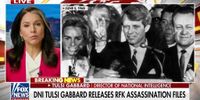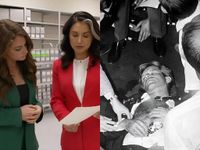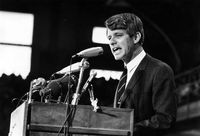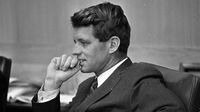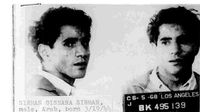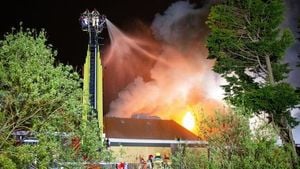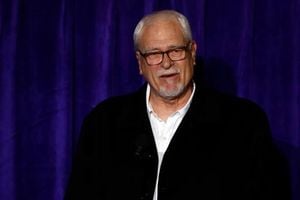The Trump administration has begun releasing the first batch of previously classified records relating to the 1968 assassination of Senator Robert F. Kennedy, providing the public with access to more than 10,000 pages of government files and potentially reigniting debate over the killing that took place nearly six decades ago.
The declassification effort was ordered by President Donald Trump shortly after taking office and is backed by the senator’s son, Health and Human Services Secretary Robert F. Kennedy Jr. The first tranche of files became available online on Friday, April 18, 2025, with further records expected in the coming months.
Director of National Intelligence Tulsi Gabbard, who is overseeing the release, said the move reflects the administration’s commitment to transparency. “Nearly 60 years after the tragic assassination of Senator Robert F. Kennedy, the American people will, for the first time, have the opportunity to review the federal government's investigation,” Gabbard stated.
The newly available files have been released in partnership with the National Archives and are being published with limited redactions for privacy reasons. According to Gabbard, another 50,000 pages of material related to the assassination were found in FBI and CIA storage facilities and will be reviewed and made available in due course.
The assassination of Senator Kennedy occurred in Los Angeles in June 1968 while he was running for president. Sirhan Sirhan was arrested at the scene and later convicted of murder. While Sirhan has admitted to the killing at various times, he has also denied responsibility or claimed memory loss. His requests for parole have been repeatedly denied, most recently overturned by California Governor Gavin Newsom after a 2021 recommendation by the state’s parole board.
Robert F. Kennedy Jr. has long questioned the official account of his father’s death. He has voiced support for the declassification process and, in a notable departure from his siblings, advocated for Sirhan’s release during his 2021 parole hearing. “I’m very grateful,” Kennedy Jr. said regarding the document release.
While much of the original investigation was handled by Los Angeles officials and FBI documents have been publicly available through California archives for years, it remains unclear whether the newly released federal records will provide significant new insight. Some researchers remain skeptical of the conviction, citing disputed witness accounts and reports of additional bullets at the crime scene, while others maintain that Sirhan acted alone.
The Trump administration’s release of the RFK files follows similar efforts involving the 1963 assassination of President John F. Kennedy and the 1968 killing of civil rights leader Martin Luther King Jr. Whether these newly disclosed documents will shed light on lingering questions or fuel further speculation remains to be seen, but the move marks a significant step in making previously sealed government records accessible to the public.
In a recent exclusive interview, Gabbard emphasized the importance of this release, stating, “Today is a big day.” She noted that it is the first time the country will be able to see documents that have been sitting at the National Archives around the assassination of Senator Robert F. Kennedy.
These documents have been in storage, never scanned or reviewed by the public before. Gabbard explained, “Thanks to President Trump’s leadership, and his executive order mandating maximum transparency, we have had well over a hundred people who have been working around the clock, going page by page, scanning them in, going through these reviews…all to lead us to this day.”
On the night of the assassination, Kennedy was shot in the kitchen pathway of the Ambassador Hotel in Los Angeles shortly after midnight on June 5, 1968. He had just delivered a victory speech after winning the South Dakota and California Democratic Primaries. As he shook hands with the hotel staff, Sirhan approached and opened fire, hitting Kennedy three times and injuring five others.
Sirhan was convicted of murder and has since claimed to have little or no recollection of the shooting. In a 1989 prison interview, he expressed feelings of betrayal towards Kennedy for his support of Israel, which he believed justified his actions. In contrast, Robert F. Kennedy Jr. has suggested the possibility of a second gunman being involved in his father's assassination, raising questions about the validity of Sirhan's conviction.
“I was disturbed that the wrong person might have been convicted of killing my father,” Kennedy Jr. told the Washington Post after visiting Sirhan at the Richard J. Donovan Correctional Facility. He added, “My father was the chief law enforcement officer in this country. I think it would have disturbed him if somebody was put in jail for a crime they didn’t commit.”
As the documents are made available, speculation continues about the circumstances surrounding the assassination. Gabbard warned that the newly released RFK files may challenge details of the current narrative surrounding Kennedy’s death. “Of course there are a lot of different theories and questions surrounding these assassinations,” Gabbard explained. “People will find in the release today, there is no ‘smoking gun,’ but there are a lot of things that have not been previously known that really call into question what really happened — and who was behind it.”
Included in the released documents are diplomatic cables referencing various countries involved in discussions surrounding Kennedy's assassination, such as Kuwait, London, Tel Aviv, Beirut, and Benghazi. Gabbard emphasized that people will need to examine these files for themselves to understand the realities they present.
In addition to the RFK files, the National Archives facility in College Park also houses records pertaining to the JFK assassination and other historical artifacts, including the last will and testament of Adolf Hitler. As Gabbard concluded her tour of the archives, she noted the significance of these historical documents and the stories they tell.
As the public gains access to these long-hidden records, the hope is that they will provide clarity on the events surrounding Senator Kennedy’s assassination and perhaps even reshape the narrative that has persisted for decades.
